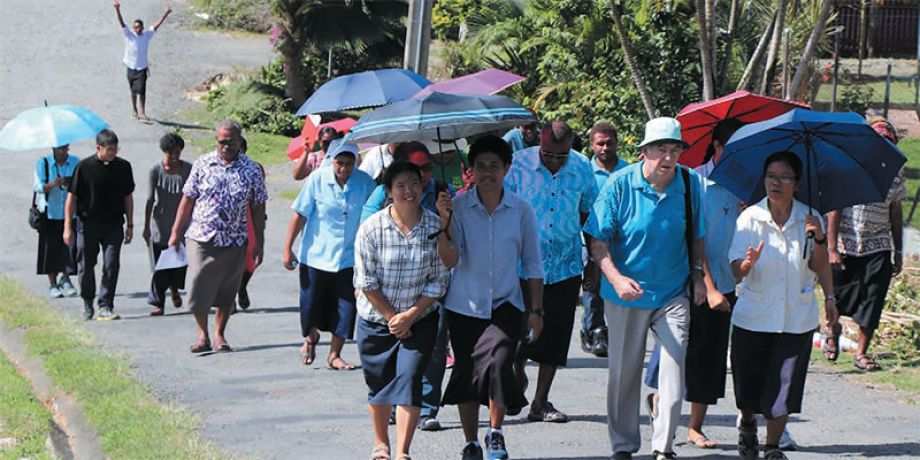
New Ways to Worship
The Columban Interreligious Dialogue Desk in Fiji was initiated in May 2019. I was asked to advise and guide the coordinator, Ms. Priscilla Magdalin. Priscilla had worked for some years with Interfaith Search Fiji and had many contacts among leaders of religious groups in Fiji. We decided that our goal would be to interest young people in interreligious dialogue.
A Series of Events
The first organized event was a one- day pilgrimage by a Catholic group to five different places of Hindu and Sikh worship in Suva. This was followed by a clean-up of the foreshore along a popular recreation area of the city by Christian, Hindu and Muslim young people. The Columban parish of Raiwaqa then hosted an Interreligious Social and Spiritual Youth Event during which performances (including hymns, dances, and role plays) were given by Muslim, Hindu, Sikh and Catholic youths.
A pre-Christmas event saw about 150 young people from different religious groups present cultural items through music, art, carol singing, dances and role plays on the Christmas message of peace. At the end of February with Hindu, Muslim and Christian fasting periods approaching, youth representatives of those religions shared their experience of fasting as a spiritual discipline. In mid-March 2020, Covid-19 arrived in Fiji and severe restrictions including lockdowns and a curfew followed, enforcing a difficult isolation on a communal people.
Fiji has been blessed so far. Although nineteen people were infected by coronavirus no one has died from it. But people were very fearful especially in the early stages. Many workers lost their jobs or had reduced hours of work. Hunger threatened the poor who had no reserves. Children got bored, and families were further disorientated by closed churches, temples, and mosques. Our Catholic Church began to serve its members through television, social media, and practical charity at the parish level. We wondered how people of other faiths were adapting to the changed environment.

An Interreligious ZOOM Meeting
At the end of April we proposed an interreligious ZOOM meeting to share our experiences of the restrictions. Priscilla contacted the participants and arranged the meeting for an evening in mid-May. I, as host, welcomed the six participants and invited them to share what the coronavirus experience had meant for them spiritually.
Asheeta Sharma, a Sanatan Dharm Hindu, was not affected much by the restrictions since she normally prays and worships at home. However, the nine day celebration of Ram Navami (birthday of Lord Rama), could not be celebrated in a temple or by inviting devotees to gather at a home. Asheeta’s family said the prescribed prayers and preformed the ritual of placing a statue of the infant Lord Rama in a cradle. ey rocked it singing devotional songs as though coaxing a child to sleep.
Loata Manu of the Bahai faith reported that families said prayers and sang chants together through ZOOM during the 12 days feast of Ridvan. This is Bahai’s greatest festival which celebrates their founder Baha’u’llah’s self-manifestation as divine in 1863.
The Anglican Church representative, William Damudamu, found that worship of God became more personal for him during the Covid-19 lockdown and restrictions. He connected with other Anglicans through Facebook and Messenger. His family decorated their home with palms on Palm Sunday, took turns in keeping vigil during Maundy Thursday night and meditated on Jesus’ seven words from the cross on Good Friday.
Rahul Prasad of the Satya Sai Baba organization found it a challenging time, for which people were not prepared. Their members prayed at home for the world. A devotional tool kit with resources, which included Sai Baba literature and audio clips, was uploaded onto Google Drive. Spirituality doesn’t stop when temples are closed. Our bodies and our homes are also temples where we can worship God.
Harmit Singh, a member of the Sikh religion, said that their members celebrated the feast of Baisakhi by using social media and live streaming. His family recited Gurbani hymns from their scripture, the Guru Granth Sahib, at home. Videos and clips from YouTube and other resources were shared among devotees. Their founder, Guru Nanak, said that if we conquer the mind we can conquer the world.
Titilia Tabua, a Catholic, was the last speaker. Her nieces and nephews, dressed in their best clothes, reminded everyone in the family to be in front of the TV by 9:00 a.m. on Sundays for the televised Mass. The lockdown gave her the opportunity to read the Bible more and reflect on her life and faith. Small Christian Communities in her parish used Viber and Messenger to share on the Bible.
Conclusion
After the initial round of sharing, all participants expressed their happiness at taking part in the ZOOM session. They noted that they all had many experiences in common, especially in deepening their personal faith and in using technology to share prayer, experiences and resources with other members.
Columban Interfaith coordinator, Priscilla Magdalin thanked everyone for joining the session. Everyone made a short silent prayer for each other before bidding good bye and God’s blessing on all. The 45-minute session had connected us to a wider religious world of family and festivals, encouraging us all to hope in God and to creatively adapt and deepen our faith.
Columban Fr. Frank Hoare lives and works in Fiji.